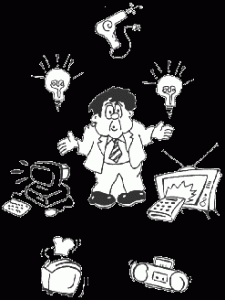
Working memory is that part of the brain where you hold items in conscious attention. It’s the scratch-pad where you manipulate maps in conscious reasoning. It is a critical component of all kinds of intelligence (IQ, EQ, etc.)
The problem with working memory or your conscious mind is that it is very resource intensive, it is very small, and it is easily overwhelmed by distractions and emotions. You’ve probably heard the average person can hold seven pieces of data in working memory at once. That’s probably overstating the case because you can hold seven numbers in working memory at once if you constantly repeat them. You cannot hold seven complex ideas in working memory at once. They compete with each other for use of limited circuits.
A lot of new research is showing that cognitive effort depletes your mental resources and you perform significantly worse on subsequent tasks. Make one difficult decision and your ability to make a second difficult decision is reduced. All conscious thinking uses up these resources and the more conscious effort it requires the more the resources are depleted. Will-power and self-control may not seem like the same thing as solving a complex problem, but they too rapidly deplete your brain’s thinking resources.
People who expend effort on a cognitively challenging task have measurably lower levels of blood glucose. Restoring the blood glucose levels restores performance. So one solution is to drink sugary drinks, but then that has a lot of other long-term and even short-term disadvantages.
The best solution is to learn optimize your use of your limited mental resources.
How To Optimize Your Working Memory
-
In this case, less is truly more. If you use up mental resources on the unimportant, you will have fewer available for the important even if you have the time. So much in the personal development world emphasizes time, when time may not actually be the most important factor. So don’t think when you don’t have to think. Remember that the next time you are agonizing over what to wear, which movie to see, which restaurant to choose, etc.
-
Do your most mentally challenging tasks first. If you spend 30 minutes processing email before you think about prioritizing your day, you will have spent a great deal of mental resource reserve on a relatively simple and probably unimportant task. Do the most important and most difficult tasks first, even though your brain will want to do the easiest tasks first.
-
If you are holding ideas in your head, in working memory, you are using up valuable resources that could be better spent on comparing or manipulating those ideas. This is why mind maps, lists, or any other physical representation of an idea works. Instead of using your brain’s resources to hold those ideas, you are holding them out in the physical world.
-
A picture is worth a thousand words and this is surely true in regards to mental resources. Your brain is a visual machine and you can hold ideas more efficiently in pictures than in words.
-
Strip out the essential elements of complicated ideas. Getting down to just a few core concepts makes it much easier to manipulate them in your mind.
I have more to say on this, but I feel like I’m probably overwhelming your working memory so this article will be continued…
Part II can be found here: Optimizing Your Working Memory – Part II
What do you think? Leave a comment and join the conversation.

